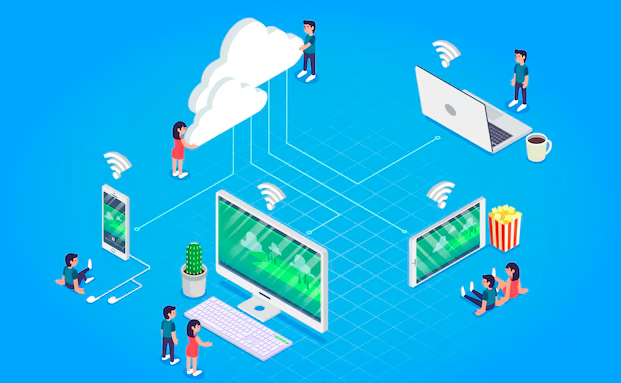Integrating Sales Cloud with Interactive Voice Response (IVR) systems in customer engagement presents a powerful synergy that can revolutionize how businesses interact with their customers. Organizations can confidently unlock many practical benefits by harnessing Salesforce Sales Cloud’s power within the IVR framework.
These benefits streamline processes, enhance customer experiences, and drive operational efficiency, instilling confidence in the integration’s effectiveness. In this blog, we will explore five key ways in which Salesforce Sales Cloud can elevate the functionality and effectiveness of your IVR system. Once you’ve read the article, contact a Sales cloud consultant about Consulting Services to get started!
An Improved Customer Experience
You could have the best product or service, but it will not last long if your customer experience is subpar. The Salesforce sales cloud is a central customer data capture and management repository. Examples of this data include:
- Customer contact information (names, email addresses, contact details, company information)
- Sales History (past purchases, sales rep interactions, quotes)
- Customer support interactions (logged issues, service tickets, customer communication history)
- Customer preferences (product interests, communication channel preferences, website behavior)
This information lets businesses learn about customers, what they’re buying, which marketing strategies work, and more. This information comes from various sources and is collected through different channels. The most common include:
- Online forms to collect customer contact and lead information
- Sales representatives manually enter customer information
- Emails automatically log customer information with the associated contacts
- Various third-party integrations (web analytics tools, marketing automation tools)
Read More: Sales Funnel Salesforce
Better Data Accessibility
Customer service heavily relies on updated customer data being available. The Salesforce sales cloud has solid integration capabilities with industry-standard tools such as native APIs. These APIs let two systems communicate with each other, guaranteeing customer data in Salesforce immediately reflects IVR-collected data.
Having this functionality directly influences customer service for both agents and customers alike. Here’s how:
- It removes data discrepancies (outdated or incorrect information) that significantly reduce customer frustration. Real-time customer data sync helps customer service agents consistently access the latest customer data.
- Having the latest customer data ensures the IVR efficiently directs customer calls and provides correct resolutions. Customers spend less time navigating menus and more time speaking with the right agent for the job.
- Real-time data allows the IVR to offer custom greetings or present context-aware options during the first interaction. In this scenario, the customer experience is top-quality right out the door.
Improved data accessibility ensures that the customer service IVR has immediate access to customer information whenever they call. Here’s how data accessibility lets representatives deliver better success:
- Faster information collection
- Improved operational efficiency
- Significantly customized interactions
- Improved first-call resolutions
Combining customer service with real-time data transfer, the Salesforce Sales Cloud and the IVR system create a streamlined experience for agents and customers.
The result is exponentially improved customer satisfaction and empowered customer service agents with all the information they need to give the best possible response. Integration services should walk you through the entire process when you’re getting started.
Enhanced Call Routing and Management

Routing Based on Customer Data
The IVR automatically routes calls to specialized agents by analyzing customer information in Salesforce. Customers with technical issues are routed to that line product specialist, while customers with billing inquiries are connected to an account manager.
Skill-Based Call Routing
The IVR matches customer concerns with agent expertise to properly route calls. Customer service agents have varying skill levels, and this skill-based call routing takes advantage of them. Customers with warranty claim concerns are connected with agents with claim management experience.
Availability-Based Call Routing
Calls are assigned to agents based on who is available to answer them. Agent activity status is integrated with Salesforce, so when an agent is ‘ready,’ the call is routed to them. This ensures shorter wait times and faster resolutions.
Most customer service centers combine all three methods to assign calls. Integrating different programs allows agent status and expertise to influence the calls they receive. All of this occurs in real-time, almost instantly.
Scalable Automation Potential
Automation across different industries has changed the way the world works. Software and algorithms automatically execute tasks precisely as they are programmed, right when they’re programmed to. With Salesforce, users can access their comprehensive automation tools seamlessly, integrating with IVR systems. Speaking with a Salesforce consulting partner is the best way to learn more.
Automation tools streamline customer service interactions by providing self-service options and automating repetitive tasks. The most common examples of this include:
- Automatic case creation depends on customer IVR input. Salesforce automatically creates new case records with customer information during the call. This includes the customer’s contact information and issue descriptions.
- The IVR system could redirect customers to relevant knowledge-based articles based on specific keywords or issues. This allows customers to find information independently instead of relying on agents to get answers.
- The IVR can secure payments for subscriptions and invoices without waiting for agents to walk them through the process. Integrating the IVR with secure payment gateways makes this a reality.
- Customers can schedule appointments when the IVR is integrated with Salesforce calendar tools. This allows for custom appointment scheduling, eliminating the need for a back-and-forth between agents and customers.
Automation is a pillar for various industries’ futures, and it can improve efficiency and effectiveness exponentially. Empowering algorithms to automate various mundane, repetitive tasks frees time and resources for humans to focus on more pressing matters. Automation doesn’t need rest, food, water, or holidays, and it operates 24/7, 365 making it great for business.
Read More: Salesforce vs. Oracle
Improved Consumer Analytics and Reporting
The Salesforce Sales cloud extends way beyond simple data collection. Its powerful analytical tools exponentially improve IVR system reporting capabilities. Here’s how it does this:
- Improved reporting features allow it to create custom reports and dashboards that combine Salesforce customer information and IVR call data. The insights from this include:
- Issue type frequency
- Department-specific call volume
- Average call wait times
- Customer self-service options (payment automation, using knowledge base articles)
- Data analysis that combines real-time and historical data to identify emerging trends and issues. Analysts can track performance over specific periods and gauge changes’ impact.
Conclusion
Salesforce sales cloud implementation and integration with your IVR system offer a strategic advantage in today’s customer-centric landscape. Implementing the outlined strategies optimizes IVR interactions and personalized customer engagements and drives meaningful outcomes, empowering businesses to control their service and sales strategies confidently.
Embracing Salesforce Sales Cloud in your IVR ecosystem enhances operational efficiency and fosters stronger customer relationships, sustained growth, customer service, and sales success. Prioritizing customer experiences and efficient communication channels, combining Salesforce Sales Cloud with IVR technology is a game-changing solution that elevates customer interactions, positioning businesses as industry leaders committed to excellence at every touchpoint.
FAQs
What is IVR integration in Salesforce?
IVR integration in Salesforce allows your to connect an interactive voice response (IVR) system to the Salesforce CRM. The result is streamline customer calls that leverage task automation and intelligent call routing.
Does Salesforce have VoIP?
No. Salesforce doesn’t offer native VoIP but allows third-party integrations with different cloud telephony solutions through Salesforce AppExchange or Service Cloud Voice.
What is Salesforce service cloud voice?
It is an embedded phone functionality within the Salesforce service cloud. Its features include click-to-call and Salesforce data integration with call center operations.

Hasan Mustafa
Engineering Manager Salesforce at Folio3
Hasan Mustafa delivers tailored Salesforce solutions to meet clients' specific requirements, overseeing the implementation of scenarios aligned with their needs. He leads a team of Salesforce Administrators and Developers, manages pre-sales activities, and spearheads an internal academy focused on educating and mentoring newcomers in understanding the Salesforce ecosystem and guiding them on their professional journey. Additionally, Hasan holds certification as an eCommerce expert, demonstrating an in-depth understanding of various eCommerce platforms such as Magento2, Shopify, BigCommerce, WooCommerce, and Shopware. His proficiency extends to modern technologies including React, Docker, AWS, and Google Cloud Platform. Hasan extends his professional services to businesses seeking specialized knowledge in Salesforce implementation and development.


